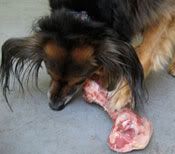 Photo Credit: Amanda Hirsch on Flickr
Photo Credit: Amanda Hirsch on Flickr
What does the cooking process do to meat?
Cooking unfolds (denatures) the proteins in meat. Imagine a string of beads wadded up in your hand. Now, imagine letting that string dangle from your finger. This is the exact same way that cooking changes the meat. It does not change the beads (amino acids). It only rearranges them. Digestion also unfolds the meat, and also chops the protein up into its component amino acids. This is accomplished both by the hydrochloric acid in your dog’s stomach and protein-digesting (proteolytic) enzymes. Thus, if the proteins aren’t yet unfolded when your dog eats the meat, they most certainly will be not only unfolded, but chopped to bits by the time the meat is digested. Then the “beads on the string” or amino acids will be on their way to building muscle and enzymes your dog needs.
Why cook meat?
What is more important to your dog’s health than whether the protein in meat is denatured is that the cooking process kills bacteria and viruses than can cause food poisoning. Dogs in the wild eat raw meat, and they also get food poisoning, worms, and all sorts of diseases. I don’t mean that you should panic if your dog should happen to scoop up a morsel of raw meat dropped on the floor, but it may not be wise to intentionally feed your dog raw meat on a regular basis, especially to the exclusion of other foods.
Isn’t natural better?
It’s also true that dogs evolved eating raw meat. Their teeth, eating habits, and many more evolutionary clues point to a diet of raw meat. However, it is also natural that animals in the wild are plagued with starvation, disease, and death. Dogs in the wild do not live as long as we want our pets to live. We want optimum health for our best friends.
Do you feed your dog a special diet? If so, what do you do? Tell us why or why not.






